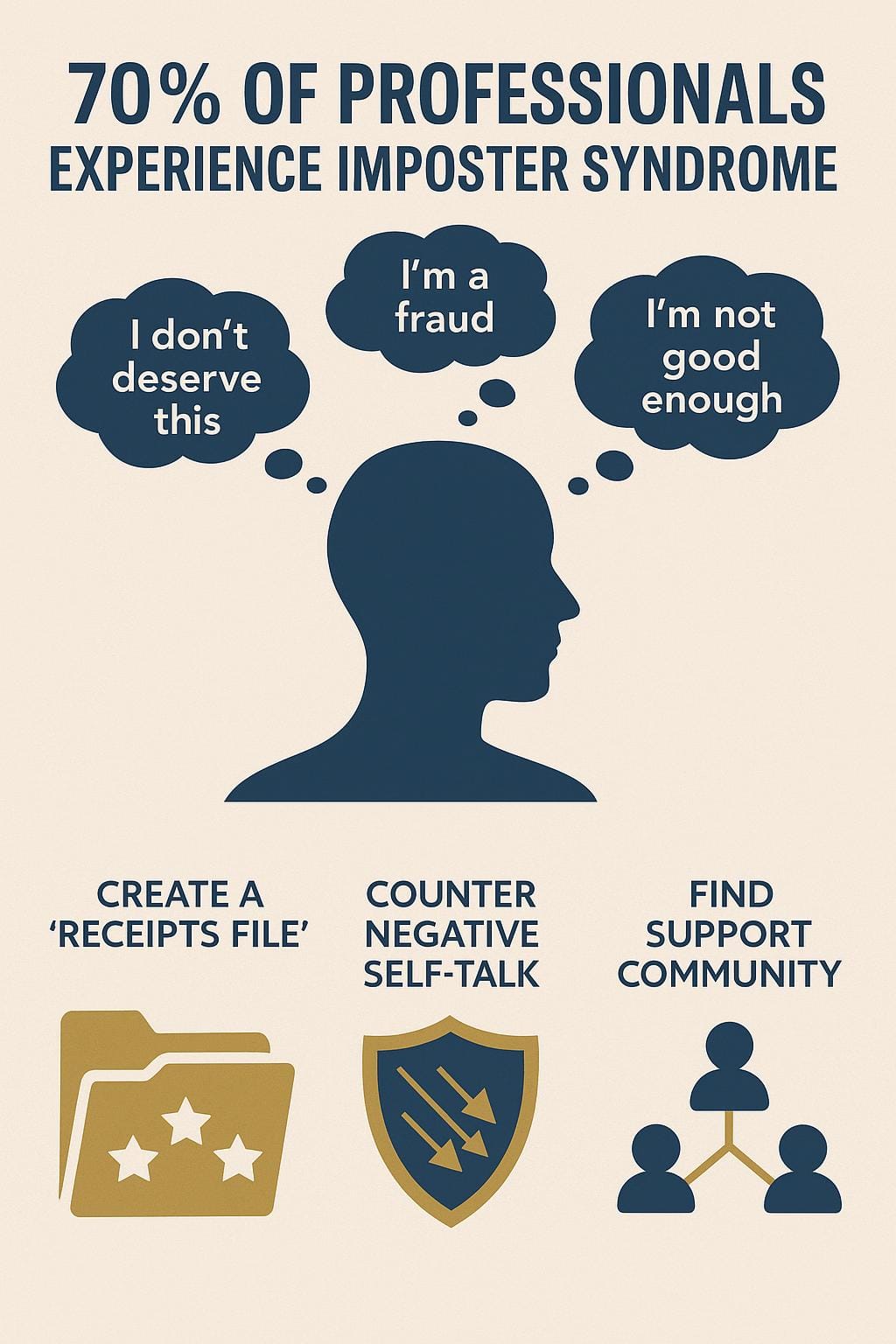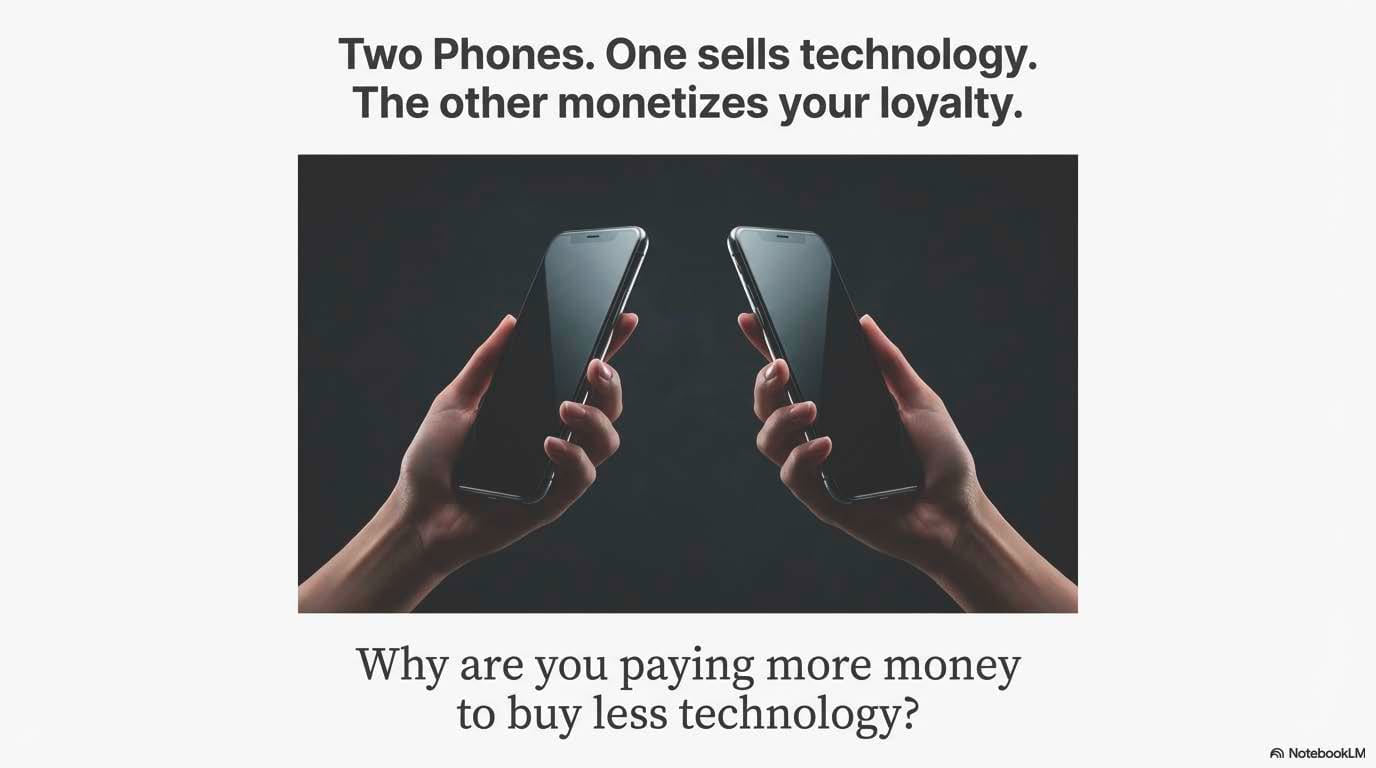That persistent voice in your head whispering you’re a fraud despite your accomplishments isn’t just annoying—it’s remarkably common and has a name. Imposter syndrome affects approximately 70% of professionals at some point in their careers, creating a disconnect between external success and internal confidence that can derail even the most promising trajectories.
Key Takeaways
- Imposter syndrome affects 70% of people during their careers, including highly successful professionals
- Physical symptoms like racing heart and flushing are common workplace anxiety responses when feeling like a fraud
- Creating a “Receipts File” of your achievements provides concrete evidence against self-doubt
- Successful professional development includes learning to talk back to your inner critic
- Finding community can validate your experience and improve career confidence
The Unfiltered Truth About That Voice in Your Head
I still remember standing at the head of the conference table, PowerPoint clicker in hand, about to present my strategy to a room full of executives. My heart wasn’t just racing—it was practically staging a jailbreak from my chest. My face flushed hot, and I was convinced everyone could see right through my carefully constructed professional facade.
That voice in my head was screaming: “You don’t belong here. They’re going to realize you have no idea what you’re talking about.” This isn’t just my experience—it’s startlingly universal. Research shows this self-doubt affects people at all levels, from new hires to CEOs.
The physical sensations are part of what makes imposter syndrome so powerful. Your body reacts as if you’re in genuine danger: racing heart, sweaty palms, flushed face, and that sinking feeling in your stomach. These physical responses make the fraudulent feelings seem more “real” and can create a vicious cycle of anxiety.
The Corporate Confidence Myth
Let’s demolish a dangerous myth right now: successful people don’t experience doubt. That’s complete garbage. In fact, high-achievers often experience more intense imposter feelings precisely because they care deeply about their performance and impact.
Studies reveal that 75% of female executives report experiencing imposter syndrome, despite climbing to positions that objectively confirm their capabilities. Even Michelle Obama, Sheryl Sandberg, and Tom Hanks have publicly acknowledged their struggles with feeling like frauds despite their remarkable success.
The reality of corporate life is that confidence isn’t about the absence of doubt—it’s about functioning effectively despite it. Perfectionism fuels many high-achievers but also makes them more vulnerable to imposter feelings when they inevitably fall short of impossible standards.
The confidence gap isn’t between you and others; it’s between your perception of yourself and others’ perception of you. Your colleagues aren’t seeing the mistakes and uncertainties that loom so large in your mind—they’re seeing your results, your communication, and your contributions.
Your Secret Weapon: The “Receipts File”
I’ve developed a concrete strategy for fighting back against that fraudulent feeling: the Receipts File. This is exactly what it sounds like—a digital or physical document where you collect evidence of your competence, your own personal “receipts” that prove your worth when that voice tries to tell you otherwise.
Your Receipts File should include several categories of evidence. Direct compliments (captured verbatim when possible), successful project outcomes with metrics, problems you’ve solved, formal recognition, and even challenges you’ve overcome all belong in this collection.
The psychology behind why this works is fascinating. We have a cognitive bias toward remembering negative feedback while dismissing positive reinforcement. The Receipts File counteracts this bias by creating an objective record you can’t dismiss or forget when you’re in the grip of self-doubt.
How to use it: Review your file before high-pressure situations like presentations, interviews, or performance reviews. Make it a regular practice to add to your collection—I suggest a weekly 15-minute calendar block for “receipt collection.” When that voice pipes up with “you’re not qualified,” you’ll have documented proof to the contrary.
Learning to Talk Back to the Voice
Beyond documentation, you need to develop scripts for talking back to that critical inner voice. When it says “You’re going to fail,” respond with “I’ve faced challenges before and found solutions—that’s actual evidence of my capability.” When it claims “Everyone else knows more than you,” counter with “No one knows everything; asking questions shows intelligence, not ignorance.”
Finding “fraud friends” is another powerful strategy for mental health at work. These are trusted colleagues with whom you can share your imposter feelings and who will provide perspective when you can’t find it yourself. The simple act of voicing these feelings often diminishes their power.
Here are some effective ways to reframe your thinking:
- Replace “I should know this already” with “I’m still learning, like everyone else”
- Transform “I got lucky” into “I was prepared to recognize and seize an opportunity”
- Swap “I’m going to be exposed” for “I bring valuable perspective and experience to this situation”
- Change “Everyone else belongs here except me” to “Many people feel this way—it doesn’t make it true”
Research shows that acknowledging imposter feelings rather than trying to suppress them actually improves performance. By recognizing these thoughts as normal experiences rather than accurate reflections of reality, you can reduce their impact on your business tips and decisions.
The goal isn’t eliminating the voice entirely—that’s probably unrealistic for most of us. Instead, aim to manage its volume and influence. Maybe confidence isn’t the absence of doubt. Maybe it’s just learning how to acknowledge that doubt without letting it drive your decisions.
Sources
Sakulku, J. (2011). The Impostor Phenomenon.
Corkindale, G. (2008). Overcoming Imposter Syndrome. Harvard Business Review.
Buchanan, L. (2006). The Impostor Syndrome: Why Some Leaders Feel Like Frauds.











